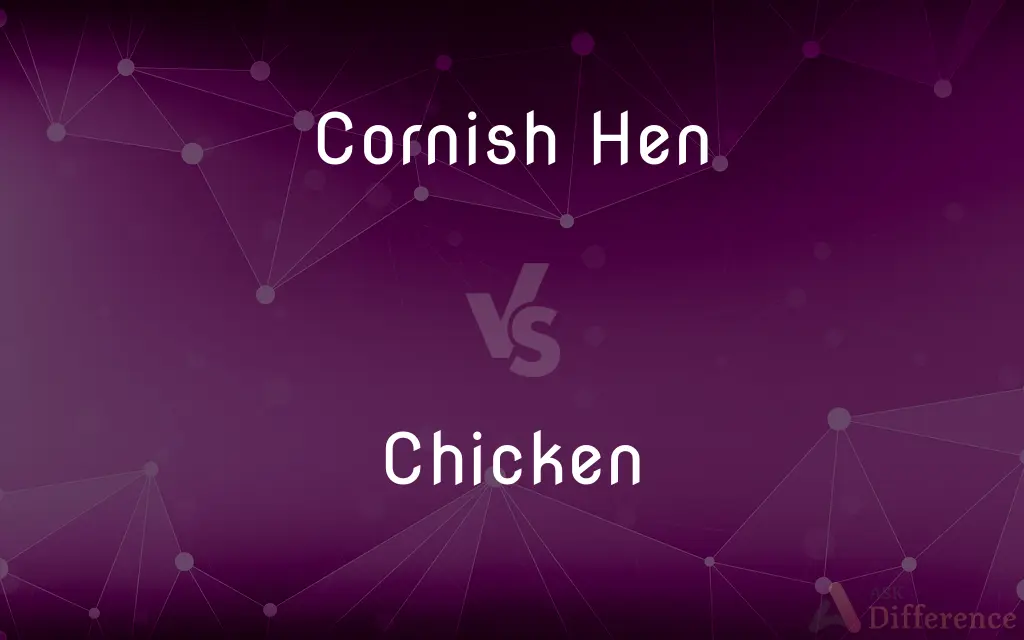Cornish Hen vs. Chicken — What's the Difference?
By Tayyaba Rehman — Published on January 29, 2024
Cornish hens are a specific breed of chicken known for their smaller size and tender meat, while chickens refer to a broader category of domesticated fowl commonly raised for meat and eggs.

Difference Between Cornish Hen and Chicken
Table of Contents
ADVERTISEMENT
Key Differences
Cornish hens, also known as Rock Cornish game hens, are a specific breed of chicken. They are small, with each bird typically weighing no more than two pounds. Cornish hens are prized for their tender meat and are often cooked whole. Chickens, in general, encompass a wide variety of breeds, both large and small, and are raised for various purposes, including meat production (broilers) and egg production (layers).
In terms of meat texture and flavor, Cornish hens offer a softer, more succulent meat due to their young age and specific breed characteristics. Regular chickens, depending on the breed and age, have a wider range of flavors and textures, and their meat can be firmer, especially in older birds.
Cornish hens are typically slaughtered at a younger age, around 4-6 weeks, which contributes to their smaller size and tender meat. Chickens raised for meat (broilers) are usually slaughtered around the age of 6-10 weeks, and those raised for laying eggs can live significantly longer. This age difference at the time of processing affects the texture and taste of the meat.
In cooking, Cornish hens are often roasted whole due to their small size, making them a popular choice for individual servings or small family gatherings. Chickens, being larger, are frequently cut into various parts such as breasts, thighs, wings, and drumsticks, and are used in a wide range of recipes, from grilling and frying to baking.
Nutritionally, Cornish hens and chickens are similar, providing a good source of protein, vitamins, and minerals. However, the portion sizes and calorie content will differ due to the difference in size and age of the birds.
ADVERTISEMENT
Comparison Chart
Size and Weight
Small, usually under 2 pounds
Varies, larger than Cornish hens
Meat Texture and Flavor
Tender and succulent
Ranges from tender to firmer
Age at Slaughter
Young, typically 4-6 weeks old
6-10 weeks for broilers, longer for layers
Cooking Methods
Often roasted whole
Versatile, cooked in various ways
Purpose
Primarily for meat
Meat and egg production
Compare with Definitions
Cornish Hen
Often cooked whole in roasting or baking.
She prepared a whole Cornish hen with a lemon and garlic rub.
Chicken
Chicken refers to a domesticated fowl commonly raised for meat or eggs.
We raise chickens in our backyard for fresh eggs.
Cornish Hen
A Cornish hen is a small, young chicken known for tender meat.
For our dinner party, we're roasting Cornish hens with herbs.
Chicken
Comes in various breeds with different sizes and purposes.
The farm has several breeds of chickens, including broilers and layers.
Cornish Hen
Typically weighs under two pounds and is slaughtered young.
Cornish hens are ideal for single servings due to their size.
Chicken
Meat texture and flavor can vary based on breed and age.
The chicken was marinated overnight to enhance its flavor.
Cornish Hen
Known for their succulent and soft meat texture.
The Cornish hen's meat was incredibly tender and flavorful.
Chicken
Used in diverse cooking methods like frying, grilling, and stewing.
Fried chicken is a classic dish in Southern cuisine.
Cornish Hen
A specific breed of chicken raised primarily for meat.
Cornish hens are a popular choice for special occasion meals.
Chicken
A staple protein source in many diets around the world.
Chicken is a versatile ingredient in many international recipes.
Chicken
A common domesticated fowl (Gallus domesticus) widely raised for meat and eggs and believed to be descended from the jungle fowl G. gallus.
Chicken
Any of various similar or related birds.
Chicken
The flesh of the chicken, used as food.
Common Curiosities
How is chicken different from Cornish hen?
Chickens are a broader category of fowl with larger sizes and various uses, while Cornish hens are specific for their small size and tender meat.
Can Cornish hens lay eggs?
While capable, they are primarily raised for meat, not egg production.
What is a Cornish hen?
A Cornish hen is a small, young breed of chicken known for its tender meat.
What's the best way to cook a Cornish hen?
Roasting whole is a popular method, often with seasonings or marinades.
Are all small chickens considered Cornish hens?
No, only specific breeds slaughtered young are classified as Cornish hens.
How long does it take to roast a Cornish hen?
It usually takes about an hour to roast at 350°F (175°C).
Are Cornish hens more expensive than regular chicken?
Yes, they can be more expensive due to their specialized breeding and processing.
Are chickens or Cornish hens better for frying?
Chickens, due to their size and meat texture, are typically preferred for frying.
What part of the chicken is most similar to Cornish hen in texture?
Young broiler chickens can have a similar tender texture.
Can you find Cornish hens in a regular grocery store?
Yes, they are commonly available in the poultry section of most stores.
Can I grill Cornish hens?
Yes, grilling is a great way to cook them, especially when split or butterflied.
Is Cornish hen meat healthier than regular chicken?
Both are similar nutritionally, but portion sizes and calorie content differ.
How do I know when a Cornish hen is fully cooked?
The internal temperature should reach 165°F (74°C), and the juices should run clear.
How many Cornish hens should I prepare for a dinner party?
Generally, one Cornish hen per person is a good serving size.
Do Cornish hens taste gamey?
No, they typically have a mild, non-gamey flavor.
Share Your Discovery

Previous Comparison
Verbal Communication vs. Written Communication
Next Comparison
Ajwain vs. JeeraAuthor Spotlight
Written by
Tayyaba RehmanTayyaba Rehman is a distinguished writer, currently serving as a primary contributor to askdifference.com. As a researcher in semantics and etymology, Tayyaba's passion for the complexity of languages and their distinctions has found a perfect home on the platform. Tayyaba delves into the intricacies of language, distinguishing between commonly confused words and phrases, thereby providing clarity for readers worldwide.
















































